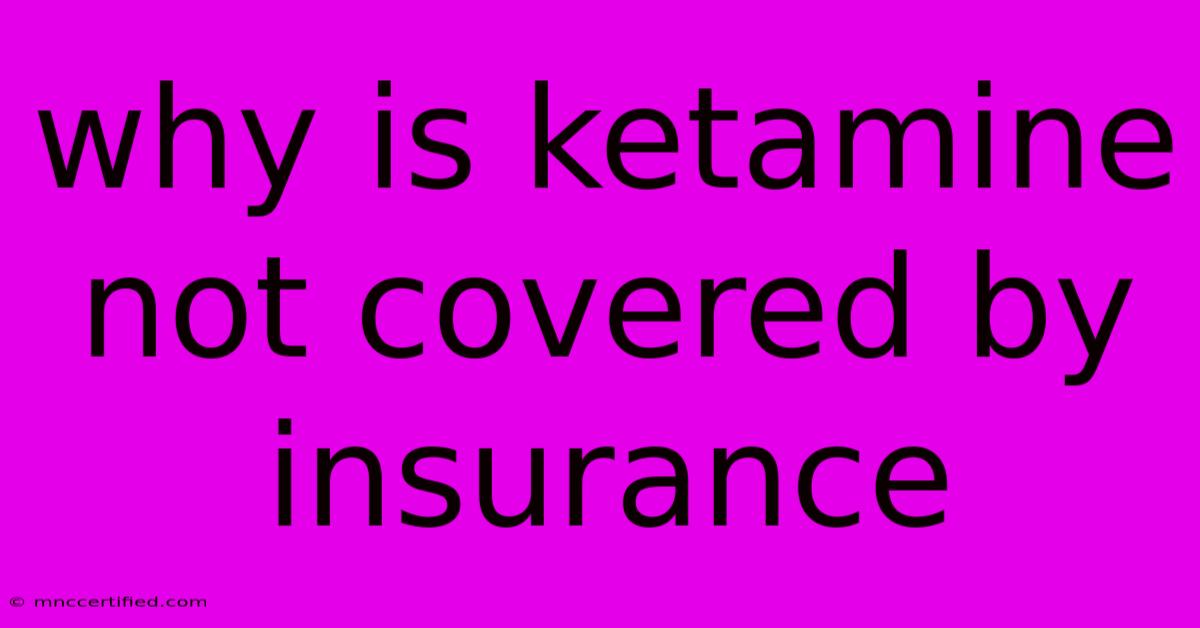Why Is Ketamine Not Covered By Insurance

Table of Contents
Why Is Ketamine Not Covered by Insurance? Navigating the Complexities of Coverage
Ketamine, once primarily known for its use as an anesthetic, has emerged as a promising treatment for various conditions, including treatment-resistant depression, chronic pain, and PTSD. However, its journey to widespread acceptance has been met with some roadblocks, particularly in the realm of insurance coverage.
The Challenge of Insurance Coverage:
Many patients seeking ketamine therapy face the frustrating reality that their insurance policies may not cover the treatment. This lack of coverage can be attributed to a number of factors:
1. Lack of FDA Approval for Specific Conditions:
While the FDA has approved ketamine for anesthesia, it has not yet approved it for treating conditions like depression, chronic pain, or PTSD. This lack of specific approval can make it harder for insurers to justify coverage.
2. Perceived "Off-Label" Use:
When a drug is used for a condition it hasn't been specifically approved for, it's considered "off-label" use. This can lead to confusion and hesitation for insurance companies, who may view off-label use as less evidence-based and more risky.
3. Limited Research and Data:
While research on ketamine's effectiveness in treating mental health and pain conditions is growing, it's still relatively new compared to established treatments. This lack of extensive data can make insurers wary of covering a treatment whose long-term efficacy and safety are still being studied.
4. Cost Considerations:
Ketamine therapy, while potentially life-changing, can be expensive. The costs associated with administration, monitoring, and post-treatment care may be considered too high for insurers to cover, especially in a landscape where budget constraints are common.
5. Varying Policies Across Insurance Plans:
Different insurance providers have different formularies (lists of covered medications and treatments) and coverage criteria. This can lead to inconsistencies in coverage, with some plans being more receptive to ketamine therapy than others.
Navigating the Insurance Maze:
Even with the challenges, there are ways to navigate the insurance landscape and potentially gain coverage for ketamine therapy:
- Work with your doctor: A compassionate and knowledgeable physician can help you understand your insurance policy, explore alternative treatment options, and potentially advocate for coverage.
- Appeal denied claims: If your insurance initially denies coverage, don't give up. Carefully review the denial letter and understand the reasons for the denial. You may be able to appeal the decision with additional supporting documentation.
- Consider alternative payment options: Some clinics offer payment plans, financing options, or sliding-scale fees to make ketamine therapy more accessible.
- Stay informed about research and FDA approvals: As research continues to support the efficacy of ketamine therapy, it's possible that insurance coverage will become more widespread.
The Future of Ketamine Coverage:
As research continues to solidify the benefits of ketamine for various conditions, it's likely that insurance coverage will evolve. The FDA may also approve ketamine for specific mental health and pain conditions, paving the way for broader insurance coverage.
Conclusion:
While navigating insurance coverage for ketamine therapy can be a frustrating experience, it's important to remember that you are not alone. Be proactive, research your options, and advocate for yourself to potentially access this potentially life-changing treatment.

Thank you for visiting our website wich cover about Why Is Ketamine Not Covered By Insurance. We hope the information provided has been useful to you. Feel free to contact us if you have any questions or need further assistance. See you next time and dont miss to bookmark.
Featured Posts
-
Timberwolves Beat Bulls Edwards Makes History
Nov 08, 2024
-
Championship Coventry Fire Manager Robins
Nov 08, 2024
-
Salvadors Tax Insurance And Notary Public
Nov 08, 2024
-
Bengals Vs Ravens Tv Channel And Time
Nov 08, 2024
-
Emergency Dental Cincinnati No Insurance
Nov 08, 2024